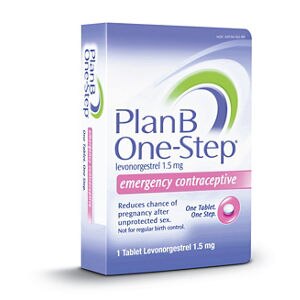A helpful and timely explainer from the Associated Press.
WHAT ARE EMERGENCY CONTRACEPTIVES?
Emergency contraceptives are used to prevent pregnancy after unprotected sex or if a method of birth control fails.
Two types of medications, sometimes referred to as “morning after pills,” are available: levonorgestrel, known by the popular brand name Plan B; and ulipristal acetate, known under the brand ella. They should be taken as soon as possible after unprotected sex.
The pills prevent ovulation, which is when an egg is released from an ovary, said Dr. Jonah Fleisher, director of the Center for Reproductive Health at the University of Illinois in Chicago. If an egg is not released, it cannot be fertilized.
ARE THEY THE SAME AS ABORTION PILLS?
No. Emergency contraceptives prevent a pregnancy. The abortion pill, mifepristone, ends a pregnancy after a fertilized egg has implanted in the lining of a woman’s uterus. It’s commonly administered with the drug misoprostol and can be taken up to 11 weeks after the first day of a woman’s last period.
DOES EMERGENCY CONTRACEPTION WORK?
Not 100% of the time. The pills’ effectiveness improves the sooner they are taken after unprotected sex, doctors said. The drugs won’t prevent pregnancies if they are taken before sex, Fleisher said.
The Food and Drug Administration has approved Plan B for use up to 72 hours, or three days, after unprotected sex. Ella is approved for up to 120 hours, or five days.
Timing is important because sperm can live inside a woman’s body for up to five days, so a woman can still get pregnant if ovulation occurs after intercourse, said Dr. Dana Stone, an OB-GYN in Oklahoma City. If a woman has ovulated prior to intercourse, the pills are unlikely to help.
“So that’s where the failure comes in. It’s based on the timing,” Stone said.
[…]
WHAT ABOUT RAPE VICTIMS?
Most rape victims don’t report the crime to law enforcement, according to Jude Foster, advocacy medical forensic and prevention programs director for the Minnesota Coalition Against Sexual Assault. Many also may not go in for immediate medical care. Not everyone knows that emergency contraceptives are an option and part of a routine rape exam, or that such an exam is free.
“Why is sexual assault used as a political football when you are talking about access to reproductive care?” Foster said. “Please don’t. It just really frustrates me.”
Stone said the belief that a woman can just take Plan B if she is raped is misguided.
“We need all kinds of options for women because nothing is a one size fits all,” Stone said. “People have transportation problems, they have financial problems. There are always barriers to some percentage of women that will keep them from accessing this in the short time frame that they have.”
See here for the reason I’m blogging about this. Note also the mention of cost in that last section. Cost is a legitimate concern.
Plan B One-Step usually costs about $40-$50. Generics like Take Action, My Way, Option 2, Preventeza, My Choice, Aftera, and EContra generally cost less — about $11-$45. You can also order a generic brand called AfterPill online for $20 + $5 shipping. (AfterPill can’t be shipped quick enough to use if you need a morning-after pill right now, but you can buy it and put it in your medicine cabinet in case you need it in the future.)
The brand of EC you buy or how much you pay for it doesn’t matter — all brand-name and generic levonorgestrel morning-after pills work just as well.
You may be able to get the morning-after pill for free or low cost from a Planned Parenthood health center, your local health department, or another family planning clinic. Call your nearest Planned Parenthood to see if they can help you get emergency contraception that fits your budget.
If you have health insurance or Medicaid, there’s a good chance you can get Plan B for free — you just have to ask your nurse or doctor for a prescription so your health insurance will cover them (even though you don’t need a prescription to buy these types of morning-after pills over-the-counter). The staff at your local Planned Parenthood health center can also help you figure out if your health insurance will pay for your morning-after pill. Read more about using health insurance to pay for emergency contraception.
Boy, it sure is a good thing that everyone has either health insurance, or Medicaid, or easy access to a Planned Parenthood near them in Texas, isn’t it? This sure would be a much bigger problem, one that would require engagement and compassion from our state leaders to solve otherwise. So clearly, anyone who needs Plan B can get it any time they want, right?


Health insurance is terrible in the US. I blame Trump. He promised to repeal and replace, but did not. Of course Bernie would have fixed this, but they refuse to nominate him, using super delegates to crush his campaign.